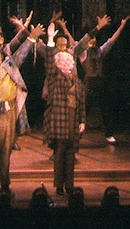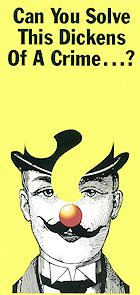Martin Wimbush interview - part 3
Feature from 2008

The company take applause

Play art work
Yes, that was all part of the fun. The imaginative thing about it. At the end the audience had to vote for several things including who the murder was. They also had to vote for the most romantic pairing in the show, who then have to sing a duet together. Lastly they had to vote for who they thought the detective was.
There are eight candidates for the murderer on stage and strangely enough I was one who was normally picked! They always pick the vicar – but I did play the part so they would, very villainous and horrible.
Right at the very end though, the very last night, I was neck and neck with the actress playing Rosa Bud. We had both been picked the same amount of times to be the murderer. She won in the end by one vote! We’re still good friends!
It was also different in other respects too, as the characters we played were actually characters playing other characters. I played Cedric Moncrief playing the Rev. Crisparkle, so it was really two characters in one. The show was in fact a show within a show. Ernie plays William Cartwright playing the Chairman.
It was an Edwardian music hall company putting on the show ‘The Mystery Of Edwin Drood’. It was a funny, clever idea developing the show that way. We not only had a show within a show, but also the audience had to vote at the end.
How did Ernie handle the singing and dancing aspects of the show?
It was strange, but when you saw him dance, it seemed like all the pressure had lifted from him. He was very much at home doing that rather than acting. He suddenly became more relaxed and easy going; relating to the audience like the professional he was. He enjoyed that aspect of the show above anything else I think.
What happened after the first night?
After the first night we all saw the reviews. It was a big disappointment; the reviews were all pretty damp and not what we expected having thought it had gone well. They picked out the Americanism of the show, which is what we discussed earlier really. Basically saying how dare these Americans come over here and mutilate a Dickens work like this.
Critics can gang up on a show; either for it or against it, and I felt they had picked us. That was irritating really because I don’t think they looked beyond it.
Do you think they picked the show because Ernie was in it?
No not at all. Ernie did, I think, have difficulty in the role. I don’t want to be unkind but he had played Ernie Wise playing Ernie Wise for over 30 years and now he found himself having to play William Cartwright playing the Chairman. I think it phased him a little bit, having to get used to playing not only someone else, but someone else playing someone else.
Also the audience had problems disassociating Ernie from Morecambe & Wise, and couldn’t look on him as an actor easily.
Despite the production team problems, did you think it was a good show?
Yes, I think it was 80% there. Without the Americanism it could have got to 100%. If it had been properly translated for a West End audience then I think it would have been fantastic.
Another sad aspect was that the American team that had been around us constantly throughout the rehearsals and who had worked us so hard, vanished immediately after the first show. We never saw them again. They left us high and dry, all of them, on the plane back to the States.
The only person who stayed and supported us was Rupert Holmes. He stayed for about a week before leaving.
That was really disappointing; we were left with this show which we managed to keep going for two months on our own. Strangely enough, the show then began to develop its own fan base. It was extraordinary, by the end of the run the audience were cheering. People used to come back on a regular basis just to enjoy the show, we were playing to full houses.
Were you surprised then, when it folded?
Yes. We all thought, perhaps after the initial setbacks, we had made a go of it. There was always that hope that it would continue and build a larger fan base and go on to be a success.
Then the dreaded notice goes up two weeks before the closure, and then of course you have to play out the last days.
After the Americans left, did you still play it as they had wanted, or did you change it a little to suit the audience?
We still carried on as we had rehearsed it, but we did begin to relax more as the show went on and after a couple of weeks we got more into it and the show soon took on a life of its own. Although the main basis was still present, there was more fun to be had. The audience love to see that, they love to see the camaraderie of a good company together. You can tell when actors are having fun on stage.
That was the thing about Eric and Ernie; you just knew they enjoyed each others company and enjoyed being together on stage. All of the actors that worked with them have said it was just so much fun to be with them. That fun came over as you watched them.
Did Ernie start to relax too?
Yes. After the first night and a few more performances, he began to enjoy it more. He relaxed more and started to make the part his own.
Was he disappointed when it folded now that he was beginning to relax?
Yes I think he was. He was the star you see, and that puts more pressure on you. When you are contracted to do a show, part of the success of it hangs on your shoulders. You know you are there to bring in the audiences and if they don’t turn up, if they don’t pack the house out you begin to feel terrible.
Towards the end of the run I felt him withdraw from the company. He would stay in his dressing room longer and stay away from us. I don’t think he knew how to deal with it, I think his way was to retreat.
He and Eric had so much fame – it must have seemed a world away. They had a terrific writer with Eddie Braben - a perfect marriage, between performers and writer - someone who could tap in (if you’ll pardon the pun) into their way of doing comedy.
Comedians are always looking for good writers and I remember in my younger days I was working with Frankie Howerd on the BBC show And Then Churchill Said To Me and was completely surprised when he turned to me and said, did I know of any good writers. Strange, a man of such brilliance and yet so vulnerable too.
The material that Eddie Braben gave Morecambe and Wise and their enjoyment of each other and the way they used that material, just made the audience relax and enjoy it. That’s why we responded so affectionately towards them, and why we found them so funny.
What are you doing now?
Like many actors I’m waiting for the phone to ring. I have just been doing a lovely show at the Barons Court Theatre, a little theatre in London, called You’ve Been A Wonderful Audience.
It was an original play by a new young writer called Andrew Syers, strangely enough about a comedy double act.
It was a funny and sad play about two comedians coming to the end of their relationship. One of the main characters is dying of cancer and his old friend is coming to visit him in hospital.
When they come together they start to reminisce about their life. Going back in time to when they were famous and doing their sketches. You would then flash back to the hospital.
I really loved doing that piece, it was a joy to do it.
Finally, what were your fondest memories of working with Ernie?
I think the abiding memory is seeing him perform as a song and dance man. I could suddenly see that great style and charm he had. Watching all the worries lift while he was doing a routine, I could see why he connected so much to an audience and why he was so loved by so many people.
I feel privileged to have had that time with him.
I think it’s sad that the critics and audience didn’t give him a real chance.
© morecambeandwise.com 2008